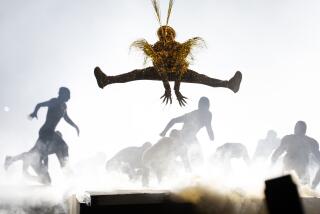In Closing, There’s No Standing on Ceremony
- Share via
ATHENS — An Olympics that had begun with empty seats and seemingly empty promise ended with a full stadium and hearts full of pride here Sunday night.
The closing ceremony of the Athens Olympics was, in the most positive sense of the phrase, a big, fat Greek celebration.
Only 17 days ago, these were the Olympics of unfinished buildings and unsold tickets. Sunday night, as chief organizer Gianna Angelopoulos-Daskalaki said, these Olympics had “shown the world the great things Greeks can do.”
The joke here had been that, when they extinguished the torch, they would simply use the entire country’s huge collective sigh of relief. Instead, when the torch went out at 10:47 local time, it left a country with eternal bragging rights.
Almost nobody thought they could. Almost everybody predicted disaster. But on a Sunday night of dancing and singing and joy that topped even the usual Greek fun-o-meter, they could listen with heads held high and chests thrust forward as Jacques Rogge, International Olympic Committee president, told the world that these were “unforgettable dream Games.”
That took the IOC rating game a step beyond the usual “best Games ever,” or in the case of the the Atlanta Olympics, “the most exceptional Games.” Athens was no Atlanta. Rogge made that very clear.
And so, what had all the makings of a Greek tragedy several weeks ago now was a reason to have a party. And so the Greeks did, in a beautiful new -- 17 days and 30 minutes old -- double-deck stadium sporting a roof that resembles the Sydney Harbor Bridge.
The ceremony recounted history, through wheat fields and traditional dance; through wine-making and weddings. The celebrators sang and swayed and invited the athletes of the world onto their stadium floor and into their hearts.
The athletes had come from 202 countries, most ever, and had been given just what the IOC preaches in its most idealistic moments: an Olympic experience.
The flags of all the countries were carried in by athlete bearers -- soccer star Mia Hamm from the United States -- and then left standing on a long runway in the middle of the dancing, mugging and hugging athletes.
There were the traditional pauses for the men’s marathon medal ceremony, the passing of the Olympic flag from the mayor of Athens to the mayor of Beijing, which is next up in 2008, and for a short cultural show from China to preview the next Summer Games.
But before and after and in between, the Greeks sang and danced and took pictures and shot off enough fireworks to make the sky over the stadium look like Riverside on a hot day. From the upper deck, they released 150,000 balloons and almost 1,000 pounds of confetti. All at once, it was like a 5-year-old’s birthday party gone big time.
When the torch was put out, the accompanying sad, almost melancholy music seemed fitting. What had been so anticipated by the people of Greece, the symbolic finish to all the hassles and headaches, was now a painful loss. Just when they started to like the Olympics in Athens, they’re taking them to China.
Having completed the mandatory formalities, the Greeks finished with a flurry of pop music, the country’s top singers doing the honors. The athletes danced with the volunteers and the volunteers danced with their bosses. There were balloons and confetti everywhere, so much that it might take more money to clean the place than it did to secure it.
There was no official ending. The recorded music kept blaring and the Greeks and the athletes kept dancing and milling around. More than 2 1/2 hours after it started, it was going strong.
Still might be.
More to Read
Go beyond the scoreboard
Get the latest on L.A.'s teams in the daily Sports Report newsletter.
You may occasionally receive promotional content from the Los Angeles Times.







